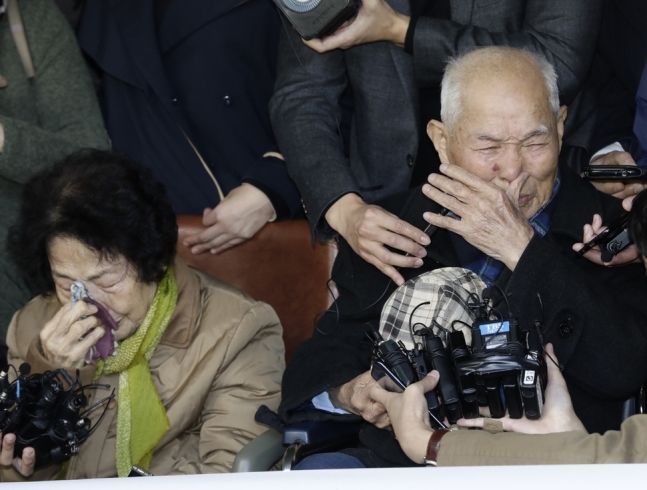 |
|
Lee Choon-sik, 94, is the last remaining survivor of a group of plaintiffs that filed suit against the Japanese company responsible for their forced mobilization and labor during the colonial occupation. Lee is seen shedding tears at the South Korean Supreme Court in Seoul on Oct. 30 after the court’s ruling that Nippon Steel & Sumitomo Metal Corporation should pay reparations to the victims. (Kim Myoung-jin, staff photographer)
|
S. Korean courts reject Japanese attorneys’ request to delay ruling on forced labor
After South Korea’s Supreme Court upheld for the first time a ruling that people conscripted for labor at Nippon Steel and Sumitomo Metal (formerly Japan Iron and Steel Co.) are owed compensation, lawsuits related to compulsory mobilization are resuming in the lower courts. A major issue in these trials is likely to be the statute of limitations, which was not clearly addressed by the Supreme Court’s decision. During a hearing on Nov. 8 in a lawsuit claiming damages for compulsory mobilization being tried by Hon. Kim Han-seong, a judge with the second civil and appeals department at the Seoul Central District Court, attorneys for the Japanese company asked the court to delay its ruling until the Supreme Court settles the issue of the statute of limitations in another trial about compulsory mobilization. But the court rejected this request and announced that it would be issuing its verdict on Nov. 29. The Gwangju District Court and High Court are also planning to issue verdicts on Dec. 5 and Dec. 14, respectively, in damages lawsuits filed by former members of the Korean Women's Volunteer Labor Corps who were forced to work for Mitsubishi Heavy Industries. The big question is what these courts will decide about the statute of limitations, considering that the Supreme Court has yet to settle that question. Damages lawsuits must be filed within three years of an individual becoming aware that they were harmed by an illegal act. After that time has passed, the individual loses his or her right to claim damages. Effectively, the key question is when the court will decide the victims of compulsory mobilization became aware of the harm done to them. Attorneys for the victims of compulsory mobilization argue that this date should be regarded as Oct. 30, when the Supreme Court finally ruled on the pending case. Kim Se-eun, an attorney, explains that while the Supreme Court in 2012 overturned rulings by the district and high court, which had rejected claims for compensation, it didn’t settle the case but remanded it to the high court. “It was not until the Supreme Court made its final ruling that the victims of compulsory mobilization learned that they’re able to receive compensation,” Kim said. If this argument stands, the statute of limitations would run until Oct. 30, 2021, three years from now. That would mean that the statute of limitations would pose no problems for the 12 cases that are currently being tried by district courts and would clear the way for additional lawsuits. On the other hand, if the courts regard May 24, 2012 (when the Supreme Court first recognized the plaintiffs’ right to compensation and remanded the case to the Seoul High Court), as the date when the plaintiffs became aware of their rights, then the statute of limitation already expired on May 24, 2015. That would mean that plaintiffs who filed lawsuits after that date are unable to claim damages. In connection with this, an investigation by the prosecutors has already turned up evidence that the National Court Administration, under the leadership of former Supreme Court Chief Justice Yang Seung-tae, attempted to block further lawsuits by delaying the Supreme Court’s final ruling until more than three years had passed after May 24, 2012, which it assumed to be the date of awareness. Setting aside all such considerations, there are also some who think the statute of limitations should not apply to crimes against humanity. “The statute of limitations shouldn’t be applied to crimes against humanity committed by the state,” said Lee Sang-gap, an attorney who has represented former members of the Korean Women's Volunteer Labor Corps in their lawsuits. In Dec. 2005, the UN General Assembly adopted guidelines stating that there are no time limits on prosecuting serious violations of international humanitarian or human rights laws that constitute crimes in terms of international law, a statement that received the approbation of the South Korean government. By Ko Han-sol, staff reporter






